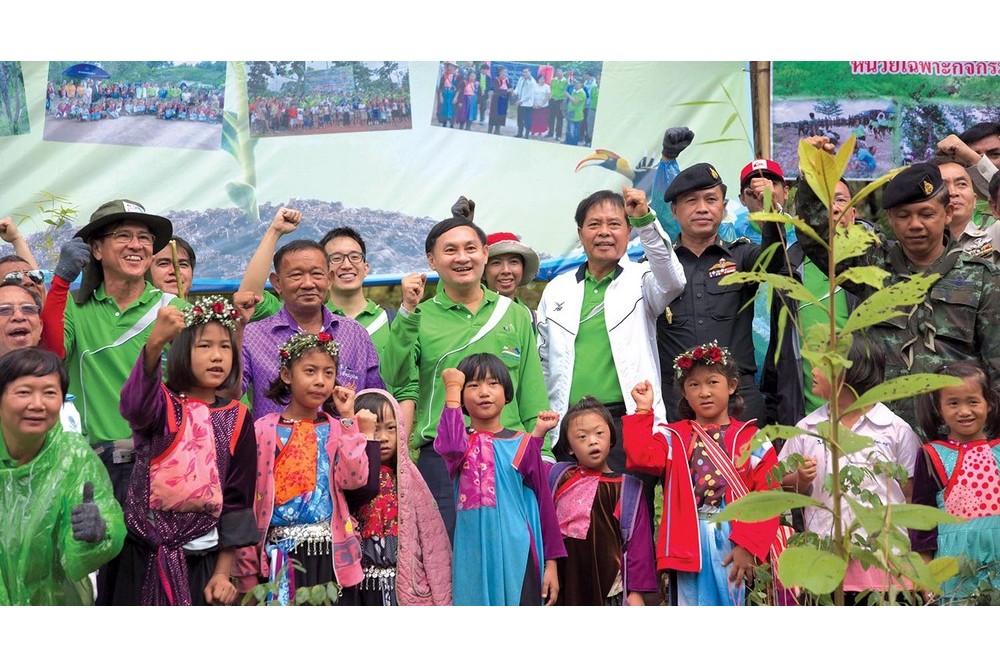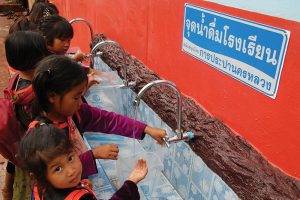
Watershed Forest Conservation Project to honor His Majesty the King
Metropolitan Waterworks Authority

In 2012, MWA started the “Watershed Forest Conservation Project to honor His Majesty the King” project with the goal of preserving and restoring the watershed forests, instilling public mind in employees and executives and raising awareness on the conservation of natural resources to the community, especially children in the community to love their watershed forests.
INTRODUCTION
In 2012, MWA started the “Watershed Forest Conservation Project to honor His Majesty the King” project with the goal of preserving and restoring the watershed forests and raising awareness on the conservation of natural resources to the community, especially children. It was also to strengthen community development by encouraging staffs and executives to participate in the project and build a good relationship with the public and private sectors, including local communities, and apply the knowledge on the water system so that people in the community enjoy safe and clean water. More importantly, it was in response to the royal speech of His Majesty the King to restore forest areas to achieve ecological balance, and strengthen and sustain communities.Although MWA’s core mission is to provide water supply to 3 provinces and is located downstream, it participates in environmental conservation with communities in remote areas to promote awareness on the importance of forests, water resources and natural resource preservation.
FRAMEWORK AND STRATEGY
Since 2012 the working committee has collaborated with the Royal Forest Department, the National Park, Wildlife and Plant Conservation, Military and local governments, the Electricity Generating Authority of Thailand, Board Committee of watersheds and local private agencies. The working group selected the Ban Rin Luang community in Chiangmai Province to be the targeted community for the project because it is located in the Mae Ping River Basin which is the upstream of the Chao Phraya River, the major river in Thailand. Most of the people in the community were Lisu who invaded and destroyed forests. The quality of the water supply there was poor.MWA proceeded to forge better relations with the local people and encouraged them to restore forests to increase watershed areas. MWA’s activities were focused towards addressing the needs of the community in terms of increasing forest areas, building check dams, conserving water resources, providing knowledge about the environment, instilling awareness in natural resource conservation including improving the water supply system by applying “waterworks” the organizational expertise, leading to clean and safe water for consumption and better quality of life.
The project also provided an opportunity for the local community and local government to participate together to attain the objectives. This cooperation is important as the local people needs to understand the importance of protecting the forests and be an active player in the project to ensure its success. The uniqueness of the project is the Rin Luang Model which is an integrated model of development to raise awareness on natural resource conservation together with developing the community for a better quality of life.
ACHIEVEMENT AND IMPACT
Since 2012, MWA has planted over 55,000 indigenous trees and over 420,000 of vetiver grasses, carried out reforestation activities in more than 220 acres, built 585 check dams, and renovated public ponds to be more hygienic. These projects benefited approximately 400 households. Water tanks and water supply systems are also working very well and water pressure is consistently good. More than 2,000 students and people in the community are now enjoying a better quality of life.As a follow-up to the project, it was found that there were positive changes in the community, especially children’s perception and behavior. As an example, in the past the children liked to break twigs and used them as toys but now they understand the value of trees and so take better care of the trees. Some intend to continue their studies in the field to help develop their own communities. Last year, students from Ban Rin Luang School participated in an academic competition and came out third at the provincial level. In addition, musical instruments given by MWA also generated revenue for the school.
In a nutshell, it can be said that the project has greatly increased the community’s awareness on natural resource conservation and set up an important network for natural conservation in the Ping, Wang, Yom, Nan and Mae Klong River basins. More important, the children are more aware of the importance of nature conservation and are ready to do their part to ensure sustainable development in their areas.
FUTURE DIRECTION
Due to the successful implementation of the Rin Luang Model at Ban Rin Luang, Chiang Mai, MWA will apply this model to other communities as there are still many communities that need help and support in the area of financing, standardizing water supply system, watershed regeneration, reforestation and natural resources conservation.
Metropolitan Waterworks Authority (MWA) is a state enterprise under the Ministry of Interior. It started operations on 16 August 1967 in pursuance of the Metropolitan Waterworks Act B.E. 2510 (A.D. 1967) with an obligation to provide raw water sources for waterworks activities, which include producing, distributing and selling treated water in Bangkok, Nonthaburi and Samut Prakan and running other businesses related or beneficial to the MWA.




